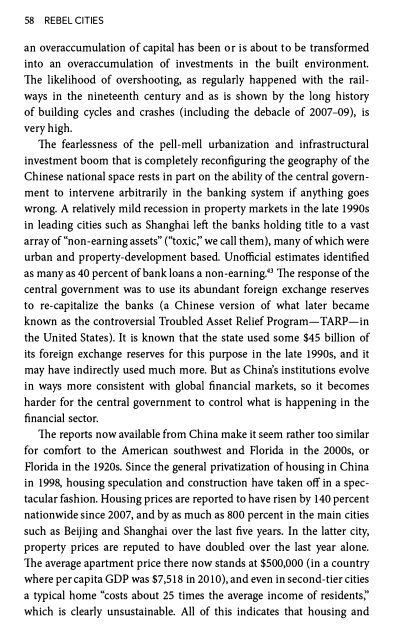Rebel Cities-David Harvey
Rebel Cities-David Harvey
Rebel Cities-David Harvey
- No tags were found...
You also want an ePaper? Increase the reach of your titles
YUMPU automatically turns print PDFs into web optimized ePapers that Google loves.
58 REBEL CITIESan overaccumulation of capital has been or is about to be transformedinto an overaccumulation of investments in the built environment.The likelihood of overshooting, as regularly happened with the railwaysin the nineteenth century and as is shown by the long historyof building cycles and crashes (including the debacle of 2007-09), isvery high.The fearlessness of the pell-mell urbanization and infrastructuralinvestment boom that is completely reconfiguring the geography of theChinese national space rests in part on the ability of the central governmentto intervene arbitrarily in the banking system if anything goeswrong. A relatively mild recession in property markets in the late 1990sin leading cities such as Shanghai left the banks holding title to a vastarray of "non-earning assets" ("toxic;' we call them), many of which wereurban and property-development based. Unofficial estimates identifiedas many as 40 percent of bank loans a non-earning.43 1he response of thecentral government was to use its abundant foreign exchange reservesto re-capitalize the banks (a Chinese version of what later becameknown as the controversial Troubled Asset Relief Program-TARP-inthe United States). It is known that the state used some $45 billion ofits foreign exchange reserves for this purpose in the late 1990s, and itmay have indirectly used much more. But as China's institutions evolvein ways more consistent with global financial markets, so it becomesharder for the central government to control what is happening in thefinancial sector.The reports now available from China make it seem rather too similarfor comfort to the American southwest and Florida in the 2000s, orFlorida in the 1920s. Since the general privatization of housing in Chinain 1998, housing speculation and construction have taken off in a spectacularfashion. Housing prices are reported to have risen by 140 percentnationwide since 2007, and by as much as 800 percent in the main citiessuch as Beijing and Shanghai over the last five years. In the latter city,property prices are reputed to have doubled over the last year alone.The average apartment price there now stands at $500,000 (in a countrywhere per capita GDP was $7,518 in 2010), and even in second-tier citiesa typical home "costs about 25 times the average income of residents;'which is clearly unsustainable. All of this indicates that housing and


